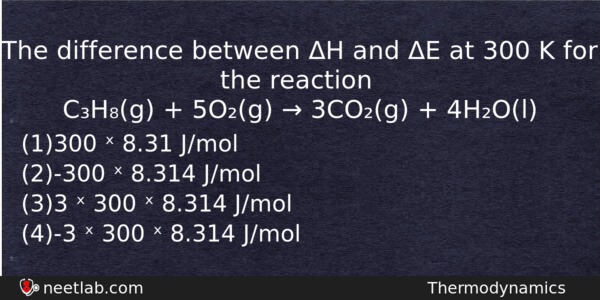| ⇦ | 
| ⇨ |
The difference between ΔH and ΔE at 300 K for the reaction
C₃H₈(g) + 5O₂(g) → 3CO₂(g) + 4H₂O(l)
Options
(a) 300 ˣ 8.31 J/mol
(b) -300 ˣ 8.314 J/mol
(c) 3 ˣ 300 ˣ 8.314 J/mol
(d) -3 ˣ 300 ˣ 8.314 J/mol
Correct Answer:
-3 ˣ 300 ˣ 8.314 J/mol
Explanation:
ΔH = ΔE + Δn(g)RT
or ΔH – ΔE = Δn(g)RT,
where Δn(g) = (3) – (5 + 1) = -3.
Thus, ΔH – ΔE = -3 * 8.31 *300 J/mol.
Related Questions: - Which of the following statements is true for the electrochemical Daniel cell
- Oleic,stearic and palmitic acids are
- A particular solid is very hard and has a very high melting point. In solid
- The most acidic among the following is
- Which one of the following explains light both as stream of particle and as wave
Topics: Thermodynamics
(179)
Subject: Chemistry
(2512)
Important MCQs Based on Medical Entrance Examinations To Improve Your NEET Score
- Which of the following statements is true for the electrochemical Daniel cell
- Oleic,stearic and palmitic acids are
- A particular solid is very hard and has a very high melting point. In solid
- The most acidic among the following is
- Which one of the following explains light both as stream of particle and as wave
Topics: Thermodynamics (179)
Subject: Chemistry (2512)
Important MCQs Based on Medical Entrance Examinations To Improve Your NEET Score
18000+ students are using NEETLab to improve their score. What about you?
Solve Previous Year MCQs, Mock Tests, Topicwise Practice Tests, Identify Weak Topics, Formula Flash cards and much more is available in NEETLab Android App to improve your NEET score.
Share this page with your friends

Leave a Reply